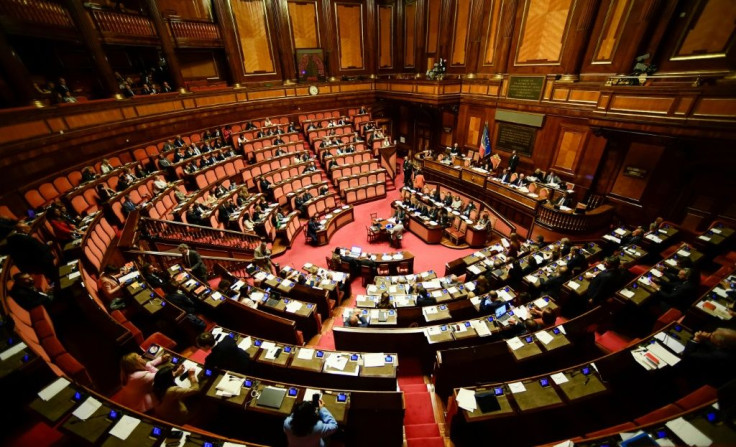Italy Parliament Votes To Slash MP Numbers

Italy's parliament on Tuesday overwhelmingly approved slashing the number of lawmakers, a move the left-leaning government hopes will help keep the far-right from power.
Reducing the number of MPs and senators in Italy by 345 was a flagship manifesto promise of the anti-establishment Five Star Movement, which rules in coalition with the country's centre-left, and promised voters it would tackle political elitism and wasteful spending.
The move, linked to broader electoral law reforms, was passed by 553 MPs, with just 14 voting against and two abstentions.
"It's done!" the M5S said on its blog. "Promise kept."
Italy currently has the second highest number of lawmakers in the EU after Britain -- some 630 elected representatives in the lower house and 315 in the Senate.
The constitutional reform, which could be subjected to a popular referendum in the coming months, cuts the number of MPs to 400 and senators to 200 from the next legislature, with an expected saving of some 100 million euros ($110 million) a year.
"It's a well-balanced reform with an excellent profile," legal expert Guido Neppi Modona told Il Fatto Quotidiano on Monday.
A reduced number of lawmakers will "lead parties to take particular care in choosing candidates," he said.
Critics have warned such a cut could affect popular representation, and increase the influence of lobbyists over governing institutions -- all for a minimal saving that will have little effect on debt-laden Italy's budget balance.
Mere horse trading?
This is the country's eighth attempt to cut its number of lawmakers since 1983, according to the Open news website.
Five Star (M5S) made the cut a condition of its alliance with the centre-left Democratic Party (PD), following the collapse of the previous, far-right coalition in August.
The PD had previously voted against the reductions, but agreed to support them if it meant clinching a deal with the M5S which would prevent a return to the polls and keep far-right leader Matteo Salvini out of power.
The party has insisted the cut be followed by a new electoral law, and is pushing for the reintroduction of a proportional representation system.
Under the current mix of proportional representation and first-past-the-post systems, a winning coalition needs more than 40 percent of the vote to have the necessary parliamentary majority.
With full proportional representation, parties or coalitions would need a much bigger majority to form a government.
'Why the haste?'
That would force League leader Salvini to ditch any plans to run alone or with a small fellow far-right party at the next election, and force him instead to turn to former prime minister Silvio Berlusconi's centre-right Forza Italy party for help, the weekly L'Espresso said.
"Why the haste to cut the seats?" constitutional expert Massimo Luciani said in the Corriere della Sera newspaper, pointing out that the coalition government -- an unlikely alliance of former foes -- could fall before changes to the electoral law can be made.
"To avoid 'surprises', the package of reforms should be launched at the same time," he said.
Lorenzo Codogno, former chief economist at the Italian Treasury Department, told AFP the pressing need to change the electoral law could serve as glue to hold the coalition together.
He warned however that "I have a feeling that (the electoral law) won't happen very soon".
International markets and European investors watching the stability of the new coalition were right "to worry about everything," he said.
© Copyright AFP 2024. All rights reserved.





















